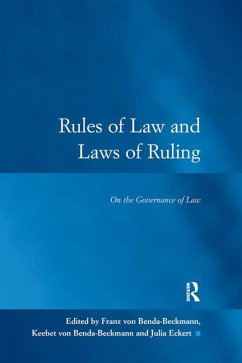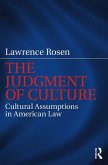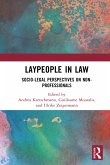Rules of Law and Laws of Ruling (eBook, ePUB)
On the Governance of Law
Redaktion: Benda-Beckmann, Franz Von; Benda-Beckmann, Keebet Von
52,95 €
52,95 €
inkl. MwSt.
Sofort per Download lieferbar

26 °P sammeln
52,95 €
Als Download kaufen

52,95 €
inkl. MwSt.
Sofort per Download lieferbar

26 °P sammeln
Jetzt verschenken
Alle Infos zum eBook verschenken
52,95 €
inkl. MwSt.
Sofort per Download lieferbar
Alle Infos zum eBook verschenken

26 °P sammeln
Rules of Law and Laws of Ruling (eBook, ePUB)
On the Governance of Law
Redaktion: Benda-Beckmann, Franz Von; Benda-Beckmann, Keebet Von
- Format: ePub
- Merkliste
- Auf die Merkliste
- Bewerten Bewerten
- Teilen
- Produkt teilen
- Produkterinnerung
- Produkterinnerung

Bitte loggen Sie sich zunächst in Ihr Kundenkonto ein oder registrieren Sie sich bei
bücher.de, um das eBook-Abo tolino select nutzen zu können.
Hier können Sie sich einloggen
Hier können Sie sich einloggen
Sie sind bereits eingeloggt. Klicken Sie auf 2. tolino select Abo, um fortzufahren.

Bitte loggen Sie sich zunächst in Ihr Kundenkonto ein oder registrieren Sie sich bei bücher.de, um das eBook-Abo tolino select nutzen zu können.
Offering an anthropological perspective, this book explores the changing relations between law and governance, examining how changes in the structure of governance affect the relative social significance of law within situations of legal pluralism.
- Geräte: eReader
- mit Kopierschutz
- eBook Hilfe
- Größe: 1.52MB
Andere Kunden interessierten sich auch für
![Re-Thinking the Political Economy of Punishment (eBook, ePUB) Re-Thinking the Political Economy of Punishment (eBook, ePUB)]() Alessandro De GiorgiRe-Thinking the Political Economy of Punishment (eBook, ePUB)48,95 €
Alessandro De GiorgiRe-Thinking the Political Economy of Punishment (eBook, ePUB)48,95 €![Laws of the Sea (eBook, ePUB) Laws of the Sea (eBook, ePUB)]() Laws of the Sea (eBook, ePUB)0,99 €
Laws of the Sea (eBook, ePUB)0,99 €![Law's Task (eBook, ePUB) Law's Task (eBook, ePUB)]() Louis E. WolcherLaw's Task (eBook, ePUB)56,95 €
Louis E. WolcherLaw's Task (eBook, ePUB)56,95 €![The Judgment of Culture (eBook, ePUB) The Judgment of Culture (eBook, ePUB)]() Lawrence RosenThe Judgment of Culture (eBook, ePUB)40,95 €
Lawrence RosenThe Judgment of Culture (eBook, ePUB)40,95 €![Racial Criminalization of Migrants in the 21st Century (eBook, ePUB) Racial Criminalization of Migrants in the 21st Century (eBook, ePUB)]() Racial Criminalization of Migrants in the 21st Century (eBook, ePUB)52,95 €
Racial Criminalization of Migrants in the 21st Century (eBook, ePUB)52,95 €![Laypeople in Law (eBook, ePUB) Laypeople in Law (eBook, ePUB)]() Laypeople in Law (eBook, ePUB)42,95 €
Laypeople in Law (eBook, ePUB)42,95 €![International Humanitarian Law and Justice (eBook, ePUB) International Humanitarian Law and Justice (eBook, ePUB)]() International Humanitarian Law and Justice (eBook, ePUB)42,95 €
International Humanitarian Law and Justice (eBook, ePUB)42,95 €-
-
-
Offering an anthropological perspective, this book explores the changing relations between law and governance, examining how changes in the structure of governance affect the relative social significance of law within situations of legal pluralism.
Dieser Download kann aus rechtlichen Gründen nur mit Rechnungsadresse in A, B, BG, CY, CZ, D, DK, EW, E, FIN, F, GR, HR, H, IRL, I, LT, L, LR, M, NL, PL, P, R, S, SLO, SK ausgeliefert werden.
Produktdetails
- Produktdetails
- Verlag: Taylor & Francis
- Seitenzahl: 302
- Erscheinungstermin: 8. April 2016
- Englisch
- ISBN-13: 9781317060932
- Artikelnr.: 44875814
- Verlag: Taylor & Francis
- Seitenzahl: 302
- Erscheinungstermin: 8. April 2016
- Englisch
- ISBN-13: 9781317060932
- Artikelnr.: 44875814
- Herstellerkennzeichnung Die Herstellerinformationen sind derzeit nicht verfügbar.
Professor Franz von Benda-Beckmann is joint Head of the Project Group on Legal Pluralism at the Max Planck Institute for Social Anthropology. He is Honorary Professor for Ethnology at the University of Leipzig, and Honorary Professor for Legal Pluralism at the University of Halle. Keebet von Benda-Beckmann is joint Head of the Project Group on Legal Pluralism at the Max Planck Institute for Social Anthropology, and Professor in Anthropology of Law, Faculty of Law, Erasmus University Rotterdam. She is a Member of the Board of Trustees of the Law & Society Association. Julia Eckert is Associate Professor and Head of Research Group, in the Project Group on Legal Pluralism, the Max Planck Institute for Social Anthropology. Her interests are in the areas of anthropology of modern state organisation, legal anthropology, group conflict, collective identities, nationalism, democracy.
Contents: Rules of law and laws of ruling: law and governance between past
and future, Franz von Benda-Beckmann, Keebet von Benda-Beckmann and Julia
Eckert; Reflections on the anthropology of law, governance, and
sovereignty, John L. Comaroff and Jean Comaroff; Private military companies
and state sovereignty: regulating transnational flows of violence and
capital, Diana Sidakis; Laws of suspicion: legal status, space, and the
impossibility of separation in the Israeli-occupied West Bank, Tobias
Kelly; Ritual and rule in the periphery: state violence and local
governance in a Peruvian comunidad, Monique Nuitjen and David Lorenzo;
Government, business and chiefs: ambiguities of social justice through land
restitution in South Africa, Anne Hellum and Bill Derman; Re-scaling
governance for better resource management?, Melanie G. Wiber and Arthur
Bull; The governance of children: from welfare justice to proactive
regulation in the Scottish Children's Hearings system, Anne Griffiths and
Randy F. Kandel; Migration and integration of 3rd-country nationals in
Europe: the need for the development of an efficient, effective and
legitimate system of governance, Marie-Claire Foblets; From the revenue
rule to soft law and back again: the consequences for 'society' of the
social governance of international tax competition, Bill Maurer; The law of
the project: government and 'good governance' at the World Bank in
Indonesia, Tania Murray Li; Corruption as governance? Law, transparency and
appointment procedures in Italian universities, David Nelken; Index.
and future, Franz von Benda-Beckmann, Keebet von Benda-Beckmann and Julia
Eckert; Reflections on the anthropology of law, governance, and
sovereignty, John L. Comaroff and Jean Comaroff; Private military companies
and state sovereignty: regulating transnational flows of violence and
capital, Diana Sidakis; Laws of suspicion: legal status, space, and the
impossibility of separation in the Israeli-occupied West Bank, Tobias
Kelly; Ritual and rule in the periphery: state violence and local
governance in a Peruvian comunidad, Monique Nuitjen and David Lorenzo;
Government, business and chiefs: ambiguities of social justice through land
restitution in South Africa, Anne Hellum and Bill Derman; Re-scaling
governance for better resource management?, Melanie G. Wiber and Arthur
Bull; The governance of children: from welfare justice to proactive
regulation in the Scottish Children's Hearings system, Anne Griffiths and
Randy F. Kandel; Migration and integration of 3rd-country nationals in
Europe: the need for the development of an efficient, effective and
legitimate system of governance, Marie-Claire Foblets; From the revenue
rule to soft law and back again: the consequences for 'society' of the
social governance of international tax competition, Bill Maurer; The law of
the project: government and 'good governance' at the World Bank in
Indonesia, Tania Murray Li; Corruption as governance? Law, transparency and
appointment procedures in Italian universities, David Nelken; Index.
Contents: Rules of law and laws of ruling: law and governance between past
and future, Franz von Benda-Beckmann, Keebet von Benda-Beckmann and Julia
Eckert; Reflections on the anthropology of law, governance, and
sovereignty, John L. Comaroff and Jean Comaroff; Private military companies
and state sovereignty: regulating transnational flows of violence and
capital, Diana Sidakis; Laws of suspicion: legal status, space, and the
impossibility of separation in the Israeli-occupied West Bank, Tobias
Kelly; Ritual and rule in the periphery: state violence and local
governance in a Peruvian comunidad, Monique Nuitjen and David Lorenzo;
Government, business and chiefs: ambiguities of social justice through land
restitution in South Africa, Anne Hellum and Bill Derman; Re-scaling
governance for better resource management?, Melanie G. Wiber and Arthur
Bull; The governance of children: from welfare justice to proactive
regulation in the Scottish Children's Hearings system, Anne Griffiths and
Randy F. Kandel; Migration and integration of 3rd-country nationals in
Europe: the need for the development of an efficient, effective and
legitimate system of governance, Marie-Claire Foblets; From the revenue
rule to soft law and back again: the consequences for 'society' of the
social governance of international tax competition, Bill Maurer; The law of
the project: government and 'good governance' at the World Bank in
Indonesia, Tania Murray Li; Corruption as governance? Law, transparency and
appointment procedures in Italian universities, David Nelken; Index.
and future, Franz von Benda-Beckmann, Keebet von Benda-Beckmann and Julia
Eckert; Reflections on the anthropology of law, governance, and
sovereignty, John L. Comaroff and Jean Comaroff; Private military companies
and state sovereignty: regulating transnational flows of violence and
capital, Diana Sidakis; Laws of suspicion: legal status, space, and the
impossibility of separation in the Israeli-occupied West Bank, Tobias
Kelly; Ritual and rule in the periphery: state violence and local
governance in a Peruvian comunidad, Monique Nuitjen and David Lorenzo;
Government, business and chiefs: ambiguities of social justice through land
restitution in South Africa, Anne Hellum and Bill Derman; Re-scaling
governance for better resource management?, Melanie G. Wiber and Arthur
Bull; The governance of children: from welfare justice to proactive
regulation in the Scottish Children's Hearings system, Anne Griffiths and
Randy F. Kandel; Migration and integration of 3rd-country nationals in
Europe: the need for the development of an efficient, effective and
legitimate system of governance, Marie-Claire Foblets; From the revenue
rule to soft law and back again: the consequences for 'society' of the
social governance of international tax competition, Bill Maurer; The law of
the project: government and 'good governance' at the World Bank in
Indonesia, Tania Murray Li; Corruption as governance? Law, transparency and
appointment procedures in Italian universities, David Nelken; Index.







